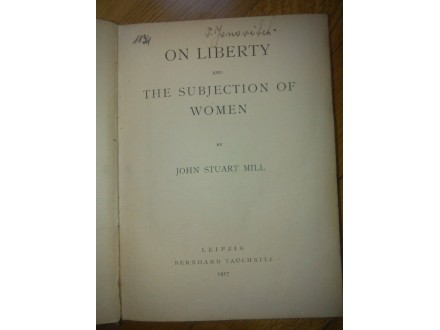POTCINJENOST ZENA- O slobodi- Mil- 1917-FEMINIZAM
| Cena: |
| Želi ovaj predmet: | 3 |
| Stanje: | Polovan sa vidljivim znacima korišćenja |
| Garancija: | Ne |
| Isporuka: | Pošta Post Express Lično preuzimanje |
| Plaćanje: | Tekući račun (pre slanja) Lično |
| Grad: |
Beograd-Vračar, Beograd-Vračar |
ISBN: Ostalo
Godina izdanja: 1900 - 1949.
Jezik: Engleski
Tematika: Istorija
Kulturno dobro: Predmet koji prodajem nije kulturno dobro ili ovlašćena institucija odbija pravo preče kupovine
Autor: Strani
John Stuart Mill - On liberty
The subjection of Women
Bernhard Tauchnitz, Leipzig, 1917.
Tvrd povez, dzepni format, 311 strana, nedostaje deo rikne.
The Subjection of Women is an essay by English philosopher, political economist and civil servant John Stuart Mill published in 1869,[1] with ideas he developed jointly with his wife Harriet Taylor Mill. Mill submitted the finished manuscript of their collaborative work On Liberty (1859) soon after her untimely death in late 1858, and then continued work on The Subjection of Women until its completion in 1861. At the time of its publication, the essay`s argument for equality between the sexes was an affront to European conventional norms regarding the status of men and women.
In his autobiography, Mill describes his indebtedness to his wife, and his daughter Helen Taylor for the creation of The Subjection of Women:
As ultimately published it was enriched with some important ideas of my daughter’s and some passages of her writing. But all that is most striking and profound in what was written by me belongs to my wife, coming from the fund of thought that had been made common to us both by our innumerable conversations and discussions on a topic that filled so large a place in our minds.[2]
While scholars generally agree that John Stuart Mill was the sole author,[3] it is also noted that some of the arguments are similar to Harriet Taylor Mill`s essay The Enfranchisement of Women, which was published in 1851.[3][4]
Mill was convinced that the moral and intellectual advancement of humankind would result in greater happiness for everybody. He asserted that the higher pleasures of the intellect yielded far greater happiness than the lower pleasure of the senses. He conceived of human beings as morally and intellectually capable of being educated and civilised. Mill believed everyone should have the right to vote, with the only exceptions being barbarians and uneducated people.
Mill argues that people should be able to vote to defend their own rights and to learn to stand on their two feet, morally and intellectually. This argument is applied to both men and women. Mill often used his position as a member of Parliament to demand the vote for women, a controversial position for the time.
In Mill`s time a woman was generally subject to the whims of her husband or father due to social norms which said women were both physically and mentally less able than men and therefore needed to be `taken care of`. Contributing to this view were both hierarchical religious views of men and women within the family and social theories based on biological determinism. The archetype of the ideal woman as mother, wife and homemaker was a powerful idea in 19th century society.
At the time of writing, Mill recognized that he was going against the common views of society and was aware that he would be forced to back up his claims persistently. Mill argued that the inequality of women was a relic from the past, when `might was right,`[5] but it had no place in the modern world.[6] Mill saw that having effectively half the human race unable to contribute to society outside of the home was a hindrance to human development.
... [T]he legal subordination of one sex to another – is wrong in itself, and now one of the chief hindrances to human improvement; and that it ought to be replaced by a system of perfect equality, admitting no power and privilege on the one side, nor disability on the other.[7]
O potcinjenosti zena, O slobodi, Dzon Stjuart Mil
tags: feminizam, zenska prava, feministi...
Predmet: 75266025











